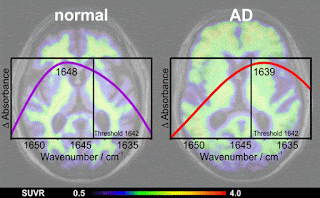New blood test useful to detect people at risk of developing Alzheimer's disease
Alzheimer's disease is thought to begin long before patients show typical symptoms like memory loss. Scientists have now developed a blood test for Alzheimer's disease and found that it can detect early indicators of the disease long before the first symptoms appear in patients. The blood test would thus offer an opportunity to identify those at risk and may thereby open the door to new avenues in drug discovery.
Alzheimer's disease (AD) is currently incurable, but there is general agreement that a minimally invasive blood biomarker for screening in preclinical stages would be crucial for future therapy. Diagnostic tools for detection of AD are either invasive like cerebrospinal fluid (CSF) biomarkers or expensive such as positron emission tomography (PET) scanning. Here, we determine the secondary structure change of amyloid‐β (Aβ) in human blood. This change used as blood amyloid biomarker indicates prodromal AD and correlates with CSF AD biomarkers and amyloid PET imaging in the cross‐sectional BioFINDER cohort. In a further population‐based longitudinal cohort (ESTHER), the blood biomarker detected AD several years before clinical diagnosis in baseline samples with a positive likelihood ratio of 7.9; that is, those who were diagnosed with AD over the years were 7.9 times more likely to test positive. This assay may open avenues for blood screening of early AD stages as a funnel for further more invasive and expensive tests.



Comments
Post a Comment